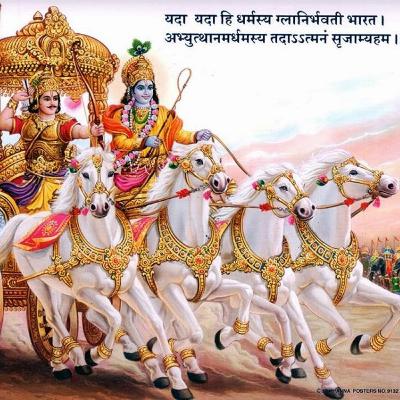Bhagavad Gita - Chapter 3 - Karma Yoga - The Yoga of Action in English
Update: 2021-01-15
Description
Chapter 3, Verse 1
Arjuna said: O Janardana, O Kesava, why do You urge me to engage in this ghastly warfare, if You think that intelligence is better than fruitive work?
Chapter 3, Verse 2
My intelligence is bewildered by Your equivocal instructions. Therefore, please tell me decisively what is most beneficial for me.
Chapter 3, Verse 3
The Blessed Lord said: O sinless Arjuna, I have already explained that there are two classes of men who realize the Self. Some are inclined to understand Him by empirical, philosophical speculation, and others are inclined to know Him by devotional work.
Chapter 3, Verse 4
Not by merely abstaining from work can one achieve freedom from reaction, nor by renunciation alone can one attain perfection.
Chapter 3, Verse 5
All men are forced to act helplessly according to the impulses born of the modes of material nature; therefore no one can refrain from doing something, not even for a moment.
Chapter 3, Verse 6
One who restrains the senses and organs of action, but whose mind dwells on sense objects, certainly deludes himself and is called a pretender.
Chapter 3, Verse 7
On the other hand, he who controls the senses by the mind and engages his active organs in works of devotion, without attachment, is by far superior.
Chapter 3, Verse 8
Perform your prescribed duty, for action is better than inaction. A man cannot even maintain his physical body without work.
Chapter 3, Verse 9
Work done as a sacrifice for Visnu has to be performed, otherwise work binds one to this material world. Therefore, O son of Kunti, perform your prescribed duties for His satisfaction, and in that way you will always remain unattached and free from bondage.
Chapter 3, Verse 10
In the beginning of creation, the Lord of all creatures sent forth generations of men and demigods, along with sacrifices for Visnu, and blessed them by saying, Be thou happy by this yajna [sacrifice] because its performance will bestow upon you all desirable things.
Chapter 3, Verse 11
The demigods, being pleased by sacrifices, will also please you; thus nourishing one another, there will reign general prosperity for all.
Chapter 3, Verse 12
In charge of the various necessities of life, the demigods, being satisfied by the performance of yajna [sacrifice], supply all necessities to man. But he who enjoys these gifts, without offering them to the demigods in return, is certainly a thief.
Chapter 3, Verse 13
The devotees of the Lord are released from all kinds of sins because they eat food which is offered first for sacrifice. Others, who prepare food for personal sense enjoyment, verily eat only sin.
Chapter 3, Verse 14
All living bodies subsist on food grains, which are produced from rain. Rains are produced by performance of yajna [sacrifice], and yajna is born of prescribed duties.
Chapter 3, Verse 15
Regulated activities are prescribed in the Vedas, and the Vedas are directly manifested from the Supreme Personality of Godhead. Consequently the all-pervading Transcendence is eternally situated in acts of sacrifice.
Chapter 3, Verse 16
My dear Arjuna, a man who does not follow this prescribed Vedic system of sacrifice certainly leads a life of sin, for a person delighting only in the senses lives in vain.
Chapter 3, Verse 17
One who is, however, taking pleasure in the self, who is illumined in the self, who rejoices in and is satisfied with the self only, fully satiated—for him there is no duty.
Chapter 3, Verse 18
A self-realized man has no purpose to fulfill in the discharge of his prescribed duties, nor has he any reason not to perform such work. Nor has he any need to depend on any other living being.
Chapter 3, Verse 19
Therefore, without being attached to the fruits of activities, one should act as a matter of duty; for by working without attachment, one attains the Supreme.
Chapter 3, Verse 20
Even kings like Janaka and others attained the perfectional stage by performance of prescribed duties. Therefore,
Arjuna said: O Janardana, O Kesava, why do You urge me to engage in this ghastly warfare, if You think that intelligence is better than fruitive work?
Chapter 3, Verse 2
My intelligence is bewildered by Your equivocal instructions. Therefore, please tell me decisively what is most beneficial for me.
Chapter 3, Verse 3
The Blessed Lord said: O sinless Arjuna, I have already explained that there are two classes of men who realize the Self. Some are inclined to understand Him by empirical, philosophical speculation, and others are inclined to know Him by devotional work.
Chapter 3, Verse 4
Not by merely abstaining from work can one achieve freedom from reaction, nor by renunciation alone can one attain perfection.
Chapter 3, Verse 5
All men are forced to act helplessly according to the impulses born of the modes of material nature; therefore no one can refrain from doing something, not even for a moment.
Chapter 3, Verse 6
One who restrains the senses and organs of action, but whose mind dwells on sense objects, certainly deludes himself and is called a pretender.
Chapter 3, Verse 7
On the other hand, he who controls the senses by the mind and engages his active organs in works of devotion, without attachment, is by far superior.
Chapter 3, Verse 8
Perform your prescribed duty, for action is better than inaction. A man cannot even maintain his physical body without work.
Chapter 3, Verse 9
Work done as a sacrifice for Visnu has to be performed, otherwise work binds one to this material world. Therefore, O son of Kunti, perform your prescribed duties for His satisfaction, and in that way you will always remain unattached and free from bondage.
Chapter 3, Verse 10
In the beginning of creation, the Lord of all creatures sent forth generations of men and demigods, along with sacrifices for Visnu, and blessed them by saying, Be thou happy by this yajna [sacrifice] because its performance will bestow upon you all desirable things.
Chapter 3, Verse 11
The demigods, being pleased by sacrifices, will also please you; thus nourishing one another, there will reign general prosperity for all.
Chapter 3, Verse 12
In charge of the various necessities of life, the demigods, being satisfied by the performance of yajna [sacrifice], supply all necessities to man. But he who enjoys these gifts, without offering them to the demigods in return, is certainly a thief.
Chapter 3, Verse 13
The devotees of the Lord are released from all kinds of sins because they eat food which is offered first for sacrifice. Others, who prepare food for personal sense enjoyment, verily eat only sin.
Chapter 3, Verse 14
All living bodies subsist on food grains, which are produced from rain. Rains are produced by performance of yajna [sacrifice], and yajna is born of prescribed duties.
Chapter 3, Verse 15
Regulated activities are prescribed in the Vedas, and the Vedas are directly manifested from the Supreme Personality of Godhead. Consequently the all-pervading Transcendence is eternally situated in acts of sacrifice.
Chapter 3, Verse 16
My dear Arjuna, a man who does not follow this prescribed Vedic system of sacrifice certainly leads a life of sin, for a person delighting only in the senses lives in vain.
Chapter 3, Verse 17
One who is, however, taking pleasure in the self, who is illumined in the self, who rejoices in and is satisfied with the self only, fully satiated—for him there is no duty.
Chapter 3, Verse 18
A self-realized man has no purpose to fulfill in the discharge of his prescribed duties, nor has he any reason not to perform such work. Nor has he any need to depend on any other living being.
Chapter 3, Verse 19
Therefore, without being attached to the fruits of activities, one should act as a matter of duty; for by working without attachment, one attains the Supreme.
Chapter 3, Verse 20
Even kings like Janaka and others attained the perfectional stage by performance of prescribed duties. Therefore,
Comments
In Channel



![7 THINGS THAT RICH PEOPLE TEACH THEIR KIDS THAT POOR DON'T | [ 7 SHOCKING RULES ] | Ric Dad poor dad 7 THINGS THAT RICH PEOPLE TEACH THEIR KIDS THAT POOR DON'T | [ 7 SHOCKING RULES ] | Ric Dad poor dad](https://s3.castbox.fm/b7/27/31/61af970ed1774bf24b9e26666c67bd6f1d_scaled_v1_400.jpg)












